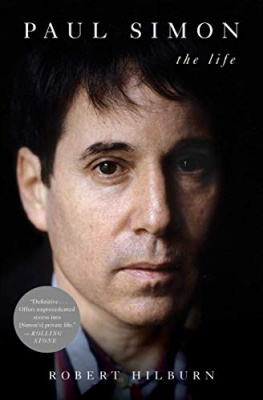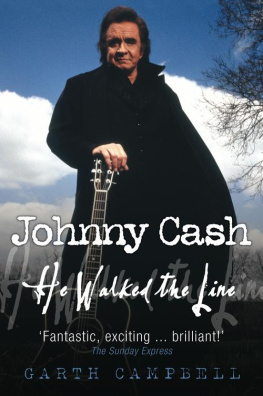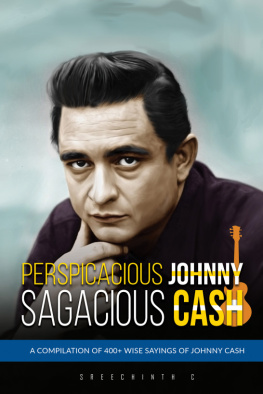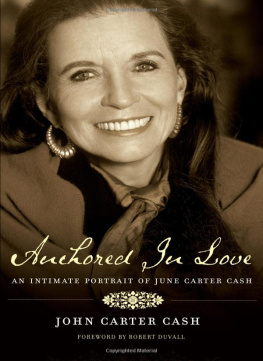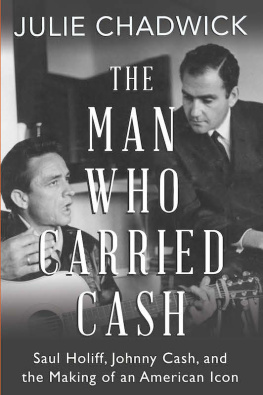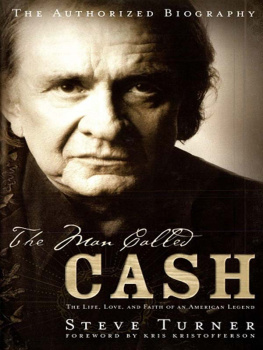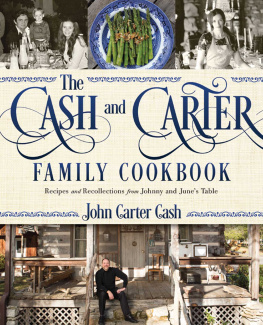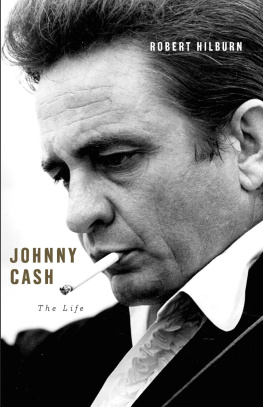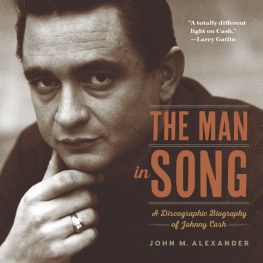In accordance with the U.S. Copyright Act of 1976, the scanning, uploading, and electronic sharing of any part of this book without the permission of the publisher constitute unlawful piracy and theft of the authors intellectual property. If you would like to use material from the book (other than for review purposes), prior written permission must be obtained by contacting the publisher at permissions@hbgusa.com. Thank you for your support of the authors rights.
SONGWRITER, HISTORIAN, FIGHTER OF CAUSES; FRIEND TO THE DEPRIVED AND TROUBLED, FRIEND OF GREAT MEN; A LEADER IN THE TEMPORAL WORLD, AND FOLLOWER IN THE SPIRITUAL WORLD, JOHNNY CASH IS THE TOTAL ENTERTAINER. AN INTERNATIONALLY FAMOUS PERFORMER, HE CARRIES HIS LOVE FOR HIS COUNTRY AND FOR COUNTRY MUSIC AROUND THE WORLD. THE MAN IN BLACK RETAINS HIS ROOTS IN THE SOIL AS HE GROWS IN CONSCIENCE AND INTEGRITY. HE IS ONE OF THE WORLDS MOST BELOVED AND HONORED STARS.
I
THE TWO-AND-A-HALF -MILE walk from the Cash familys five-room, federally assisted farmhouse in rural Dyess, Arkansas, to the town center was just long enough for young J.R. to work up a head full of dreams. For years, the third son of Ray and Carrie Cash walked the narrow gravel road with his schoolboy pals, all of them fantasizing about being cowboy movie stars like Gene Autry and Tex Ritter. But J.R. most enjoyed walking the road alone, especially at night, when the darkness felt like a shield against the rest of the world, leaving him free to pursue a dream that was far more important than he wanted to admit.
On those nights, J.R. would frequently sing to himself, he later told friends when reminiscing about his childhood days, partially to calm his nerves when he heard the rustling of cottonmouth snakes in the grass or the howl of prowling panthers in the woods a few hundred yards away. Years later, some of J.R.s old chums and even his younger sister Joanne chuckled at the idea of panthers in the woods. Snakes, yesmaybe even an occasional bobcatbut no one knew anything about panthers. He had a real vivid imagination, says A. J. Henson, who sometimes walked that gravel road with his friend. Even Cash himself often admitted that he never let facts interfere with a good story. But as Joanne put it, theres no doubting one thing about the Dyess years: J.R. loved to sing.
There was something about music that was even more magical to him than movies, a fascination that came naturally. His family, especially his mother, had always turned to songs for comfort and inspiration. Soon after he started grade school, J.R. knew he wanted to be a singer on the radio, and he began to think of that gravel road at night as his own secret stage. When he was feeling especially good, hed stop after a song, look up at the Arkansas moon, and take a bow.
The first song J.R. remembered hearing was the old hymn I Am Bound for the Promised Land. He was just three years old, but he joined the chorusOh who will come and go with me? / I am bound for the promised landas his mother sang during the 250-mile journey in a flatbed truck that took the family and its little bit of furniture across Arkansas. They had left his birthplace of Kingsland in the hill country of the south-central part of the state to travel to the fertile flat black delta land of Dyess in the northeast corner. Thanks to Franklin Delano Roosevelts New Deal program, they were about to claim what she told them would be their own promised land on earth.
But for most of the two-day trip in March of 1935, J.R. and his older brothers, Roy (born 1921) and Jack (1929), huddled together under a tarpaulin in the bed of the truck, trying to protect themselves from the punishing cold and rain. The ride along muddy roads was all the more frightening because the vehicle frequently hit potholes with such force that the boys feared the wheels might be knocked loose at any moment. Their mother tried to calm them and her two daughters, Reba (1934) and Louise (1923), with music and the assurance that God was watching over the family.
The story of Dyess had its roots in the Great Depression, when most of the farmers in the state, including J.R.s father, struggled to survive. As the price of a five-hundred-pound bale of cotton dropped from $125 in 1928 to $35 in 1932, there was panic among farmers over how to provide for their families. President Roosevelt, according to the popular version of a complicated bureaucratic backstory, came to the rescue with a plan to give distraught workers the chance of a more secure future. Through the Federal Emergency Relief Administration, funds were allocated to build small cooperative communities around the country to provide some deserving farmers with homes, twenty acres of land, and a small annual stipend for food and clothing. The social experiment also called for new buildings to house support services, including a cotton gin, general store, restaurant, school, hospital, post office, and gas station.
Officially titled Colonization Project No. 1, Dyess was one of the first cooperatives. In May 1934, more than 1,300 workers taken from Arkansass welfare rolls had started building houses and roads on a sixteen-thousand-acre spread of land. At the same time, the government began taking applications for Dyess farmers. Only Caucasians were eligible. This wasnt welfare, the applicants were told. The towns new arrivals had to work the land and then use money from the crops, chiefly cotton, to repay the government the cost of the housing, the property, and the stipend before they could receive the deed to the property. When Ray Cash heard about the Dyess project on the radio, he decided in an instant to apply.
Thousands of destitute men lined up at government offices throughout the state to apply for only five hundred homesteads. Ray Cash wasnt intimidated. He presented himself as just the kind of hardworking, industrious family man and fiercely patriotic American that he felt the government administrators were seeking. His paternal roots in North America dated back to 1667, when one of his ancestors, William Cash, came across the Atlantic from Scotland on the ship Good Intent and settled in Essex County, Massachusetts. Williams descendants then migrated to Virginia in the early 1700s and on to Georgia, where Ray Cashs grandfather Reuben Cash was born.
After Reubens plantation was destroyed by General William T. Shermans troops during the Civil War, the former Confederate soldier moved west to Arkansas in 1866. Rays father, William Henry Cash, was six. He grew up to be a farmer and a Baptist preacher, a circuit rider who served four widely separated counties. Ray, one of twelve children, was born in 1897.
In the interview process for the Dyess land, Ray stressed not only his military service (he had served in France briefly during World War I), but also how hard he had worked to support his family after farming became unprofitable. Hed pursued odd jobs, sometimes walking miles to cut wood at a sawmill or hopping a freight train to Charleston, Mississippi, to help dismantle a chemical plant. Still, there were no guarantees that he would be chosen, and he was desperate to secure some kind of permanent work. After finishing the rigorous interview, he suffered a week of sleepless nights before getting the good news. Ray Cash was one of just five applicants from all of Cleveland County to be accepted for the program.
Following the grueling truck ride from Kingsland, the Cashes arrived at their new home in Dyess, carried in the colony records as house number 226 on Road 3. Years later, photos of early Dyess houses make the residences look primitive and bare-boned, bringing to mind Walker Evanss stark photos of American poverty during the Great Depression. Indeed, the days of rainfall had left the mud so deep and thick on the property that Ray had to leave the truck a hundred yards away from the house and carry J.R. the rest of the way. Still, the new home looked like a mansion to the Cashes. It had been painted white with green trim, and there were glass panes instead of burlap sacks in the windows. The family of seven walked around the house and the barn, admiring them the way farmers might examine a prize cow.


